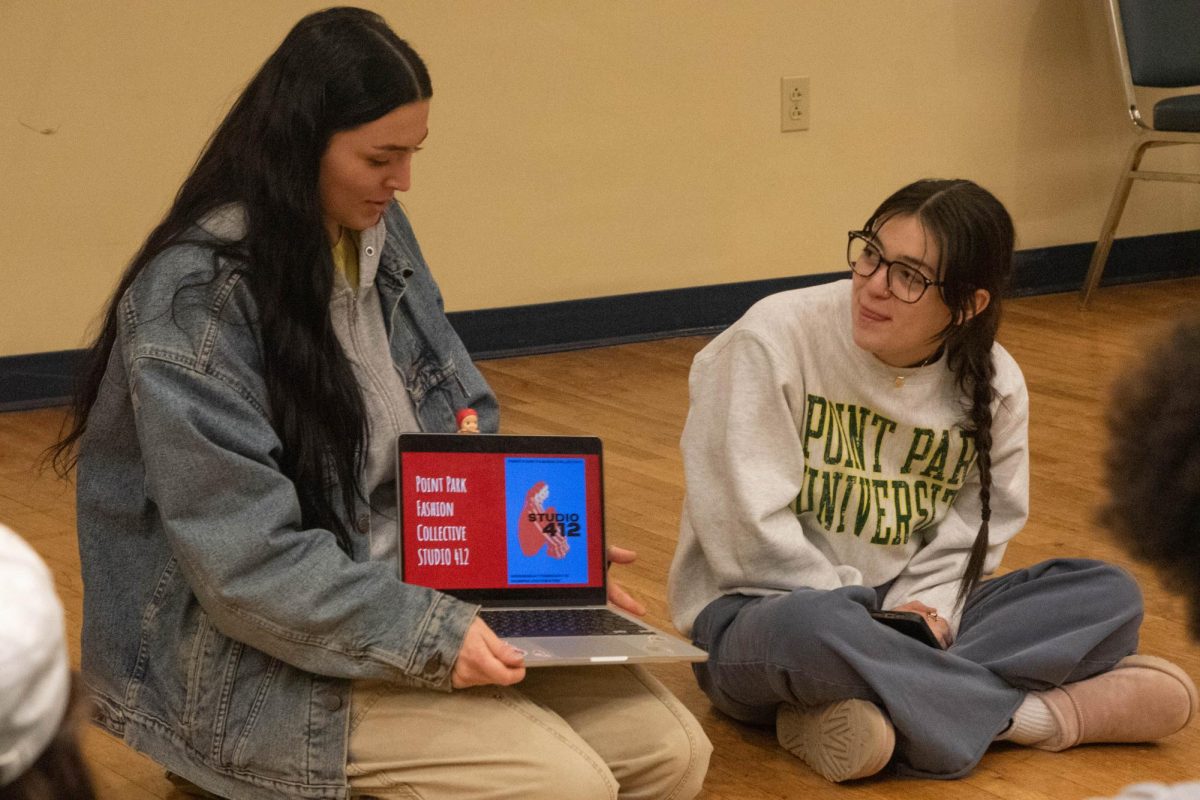When Melessie Clark found out she was cast as the lead for the Greek tragedy “Hecuba,” she knew she had some studying to do. “When I heard we were going to do a Greek play, I was actually super worried,” said Clark in an interview in Lawrence Hall Friday. “I just approached it using the techniques they teach us here in the Conservatory.” When Clark and the cast of Euripides’ “Hecuba” take the stage on Nov. 7, the Pittsburgh Playhouse will be transported thousands of years back in time. The play follows Queen Hecuba, the former wife of the King of Troy. Greek soldiers invade the city in a Trojan horse and take hostage Queen Hecuba and the women of Troy. Throughout the play, Hecuba and the women of Troy must deal with their grief, as well as their desire for revenge against the intruders. Playing the lead role in a Greek tragedy presented a challenge for Clark, who never acted in a Greek play, a distinct style of theater, before. To prepare for her role, she read several versions of the play, both with the complex Greek language and with simpler English translation. Despite the language and history of the play, Clark enjoyed making Hecuba relatable to today’s modern audiences, portraying her as “a real person in the midst of this heightened language.” “In this world, people think Greek mythology is so far-fetched, but these are people just like us who feel hurt and excitement and I like showing both sides of the character,” Clark said.In a format unique to Greek plays, the women of the ensemble act not as individuals, but as a unit called a “chorus.” These 10 women support the play by narrating the story and connecting the audience with the action happening onstage. They do this while performing specific choreography, moving in unison. “The chorus is the one thing that really makes [“Hecuba”] stand out,” said senior musical theater major and chorus member Linda Kanyarusoke in an interview in Lawrence Hall Friday. “In our case, it’s a group of 10 women moving in sync, which is really cool to watch. It’s a huge collaboration. Basically, we have to breathe together.”To prepare for the physicality of the chorus, Kanyarusoke said the women studied “viewpoints work,” a physical system used to promote unity among the cast. An additional challenge for the chorus lies in explaining the important plot points the audience does not see performed onstage. “The action happens offstage, and you need to paint a picture for the audience, see it yourself, and understand what you are talking about,” said Lexi Gleichauf, a junior musical theater major who plays a chorus member, in an interview in the George Rowland White Dance Complex Thursday.Gleichauf said she appreciates the play because it shows several different views of conflict. Kenyasouke said part of the excitement of “Hecuba” is its rich history. “Whenever people talk about the classics, they talk about Shakespeare, but this was thousands of years before that. The Greeks made theater,” Kanyarusoke said. “It’s very exciting to do a work with so much history behind it.” “Hecuba” runs at the Pittsburgh Playhouse from Nov. 8-24 with a preview on Nov. 7. For tickets call the Pittsburgh Playhouse at 412-392-8000.
Playhouse to show Greek tragedy
Written By Alexandra Zegar
•
June 29, 2016
0
Navigate Left
-
FEATURES'Burgh Bites: The best bites from this academic year
-
 FEATURESCAB hosts annual Spring Fling
FEATURESCAB hosts annual Spring Fling -
 FEATURES'Burgh Bites: Lola's Eatery: Pricey but delicious
FEATURES'Burgh Bites: Lola's Eatery: Pricey but delicious -
 FEATURES'Burgh Bites: The Nook: Trypophobia trigger warning
FEATURES'Burgh Bites: The Nook: Trypophobia trigger warning -
 FEATURESSecond annual 'Out of the Darkness' walk for suicide awareness
FEATURESSecond annual 'Out of the Darkness' walk for suicide awareness -
 FEATURES'Burgh Bites: Melt'd: An overpowering amount of barbecue
FEATURES'Burgh Bites: Melt'd: An overpowering amount of barbecue -
 FEATURESFormer SGA president books commercial with Ohio Lottery
FEATURESFormer SGA president books commercial with Ohio Lottery -
 FEATURESStudio 412 brings fashion to Point Park
FEATURESStudio 412 brings fashion to Point Park -
 FEATURES'Burgh Bites: Page's Dairy Mart: Saucy South Side hot dog
FEATURES'Burgh Bites: Page's Dairy Mart: Saucy South Side hot dog -
 FEATURESJuried Art Exhibition displays student photography
FEATURESJuried Art Exhibition displays student photography
Navigate Right

